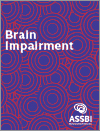
Brain Impairment
Volume 26 Number 1 2025
Limited research exists on positive experiences of informal caregivers, especially those caring for traumatic brain injury survivors. We aimed to explore these positive changes and whether caregivers experience ‘post-traumatic growth’. Ten male caregivers completed an interview and questionnaire involving a post-traumatic growth measure, revealing deepened personal connections, strengthened spiritual beliefs, personal growth/resilience, transformed life priorities and purpose, improved coping mechanisms and emergence of new opportunities. Findings suggest growth among caregivers, warranting further research to inform targeted interventions.
Many people with traumatic brain injury have changes in their emotions, thinking, and behaviour that can affect their lives for many years after injury. Managing these symptoms requires valid tools to track them. Our results support the validity of the Behavioural Assessment Screening Tool to measure these symptoms after traumatic brain injury, so the Behavioural Assessment Screening Tool could be used to help determine when people with traumatic brain injury might benefit from intervention.
‘TBIBank Grand Rounds’ is an online resource with information about how brain injury can affect the way someone communicates. We asked speech pathology educators to tell us what they think about TBIBank Grand Rounds. The educators gave positive feedback overall but also told us some helpful ways we can improve the resource. For example, we added quick links to the menu. The updated resource may help improve speech pathology care.
IB24081 Abstract | IB24081 Full Text | IB24081PDF (458 KB) | IB24081Supplementary Material (1.3 MB) Open Access Article
Many people with traumatic brain injury (TBI) report problems with social functioning. We explore their perceptions of social functioning and their attitudes towards medication that could improve social outcomes. We found people with TBI experienced many changes in social participation post-TBI and have a strong interest in improving social functioning.
IB24051 Abstract | IB24051 Full Text | IB24051PDF (460 KB) | IB24051Supplementary Material (431 KB) Open Access Article
Changes in behaviour following a severe acquired brain injury can significantly impair a person’s ability to engage in meaningful activities and fulfil important life roles. The scoping review provided evidence that interventions by allied health professionals can help mitigate behavioural challenges. However, future efforts should place greater emphasis on ensuring that these improvements lead to increased participation in daily activities, ultimately enhancing the quality of life.
IB24079 Abstract | IB24079 Full Text | IB24079PDF (684 KB) | IB24079Supplementary Material (152 KB) Open Access Article
Independent ambulation is a crucial functional outcome for stroke survivors, justifying a substantial number of inpatient rehabilitation admissions. Telerehabilitation offers a feasible alternative to in-person rehabilitation; however, evidence for its effectiveness is lacking, especially regarding ambulation. Therefore, we compared the response of two groups of patients: one following traditional in-person rehabilitation and the other following telerehabilitation. Our results encourage the use of telerehabilitation for improving ambulation.




